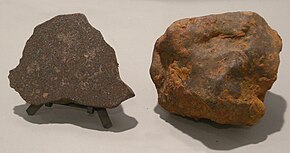| Pultusk | |
|---|---|
 | |
| Type | Chondrite |
| Class | Ordinary chondrite |
| Group | H5 |
| Composition | Olivine and bronzite, kamacite, troilite and chromite also present. |
| Country | Poland |
| Region | Ostrołęka |
| Coordinates | 52°46′N 21°16′E / 52.767°N 21.267°E |
| Observed fall | Yes |
| Fall date | January 30, 1868 |
| TKW | about 8860 kg (about 9.8 tons) |
| Strewn field | Yes |
 Distribution ellipse of Pultusk fall. | |
Pultusk is an H5 ordinary chondrite meteorite which fell on 30 January 1868 in Poland near the town of Pułtusk. The event has been known as the stony meteorite shower with the largest number of pieces yet recorded in history.[1] Made up of rocky debris, it consists of pyroxene or olivine chondrules deployed in massive plagioclase. Kamacite is also reported.
- ^ Mike D. Reynolds (2010)